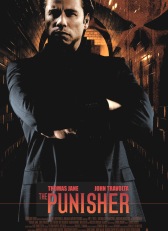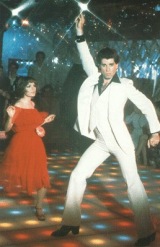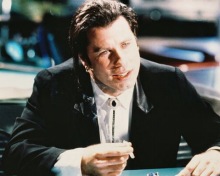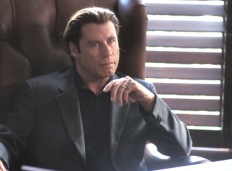
Profile & Interview: John Travolta
by Erika Hernandez
LEFT: John Travolta stars in The Punisher
 |
Profile & Interview: John Travolta by Erika Hernandez
LEFT: John Travolta stars in The Punisher |
|
![]() he term “Icon” is used all too liberally in this business. The truth is, “Icon” is an almost impossible order to fill. To surpass Celebrity or Star and graduate into this exclusive sphere, your mere image should not only induce instant recognition, but evoke certain universal traits or cultural energies. In this respect, as an Icon, your image is worth more to us than you ever were. It harnesses this trait or energy, and has been appropriated by us as a fixed trademark for larger things like “beauty” (Marilyn Monroe), “rebellion” (James Dean), “hope” (Martin Luther King, Jr.), or “antiestablishment” (Jimi Hendrix). The human psyche wants these trademarks preserved, unaffected by time. This is why most Icons have died young, are inanimate objects (the Chrysler building, the TV dinner), or animated ones (Mickey Mouse). We do not want to see them get fat and old (Marlon Brando, Elizabeth Taylor). They must be crystallized forever, as containers of the exact qualities for which we need them.
he term “Icon” is used all too liberally in this business. The truth is, “Icon” is an almost impossible order to fill. To surpass Celebrity or Star and graduate into this exclusive sphere, your mere image should not only induce instant recognition, but evoke certain universal traits or cultural energies. In this respect, as an Icon, your image is worth more to us than you ever were. It harnesses this trait or energy, and has been appropriated by us as a fixed trademark for larger things like “beauty” (Marilyn Monroe), “rebellion” (James Dean), “hope” (Martin Luther King, Jr.), or “antiestablishment” (Jimi Hendrix). The human psyche wants these trademarks preserved, unaffected by time. This is why most Icons have died young, are inanimate objects (the Chrysler building, the TV dinner), or animated ones (Mickey Mouse). We do not want to see them get fat and old (Marlon Brando, Elizabeth Taylor). They must be crystallized forever, as containers of the exact qualities for which we need them.
John Travolta—the Icon—is an exception. He is neither dead (though his career was) nor an animated figure (though he bears an uncomfortable resemblance to Scooby Doo). Not only that, he is doubly iconic. His image at once conjures up “The Late Seventies” and “The Comeback of an Icon.”
But Travolta did not just come to life in a white leisure suit. After quitting a New York drama school at sixteen to pursue acting jobs, Travolta secured his first Broadway role at eighteen, in Grease—one he would reprise in the 1978 for the big screen. Although trained in dance, method acting, and singing, it was his television work as Vinnie Barbarino “Welcome Back, Kotter” that brought him various film and television feature projects, including Brian DePalma's Carrie (1976) and of course, The Boy in the Plastic Bubble (1976).
 The making of an icon: John Travolta in his classic pose in Saturday Night Fever. |
His portrayal of Tony Manero in Saturday Night Fever (1977) earned him his first Oscar nomination. Though often remembered reductively as a polyester-clad “Guido” pointing up and down on a multi-colored floor, Travolta's performance is profound. Granted, he plays an egotistical kid who by day works in a hardware store and by night rocks the house as the local Disco god. There is more to him, however. He realizes fame's illusiveness. Tony's is more a world of bridges—gazing at them, knowing their stats and histories, walking upon and taunting their edges—harboring the hope that he might one day, be able to leave his humble beginnings and cross into that vast and scary world on the other side. Tony Manero is the American dream. All dancing aside, Travolta played it with dignity and tenderness.
The late Seventies triumphs of Saturday Night Fever and Grease made Travolta an icon. But it did not take him long to become an embarrassment in the Eighties. Travolta worked steadily, and starred in a series of either unmemorable films such as Urban Cowboy (1980—a decent film, actually) and Blow Out (1981), or downright catastrophic ones.
Travolta tried to recapture his fame via two 1983 films. The first was Staying Alive, in which Tony Manero, now across the bridge, stars in a Broadway show (Tony, it was a metaphor). Then came Two of a Kind, which reunited him with Grease co-star, Olivia Newton John, whose career was undergoing similar struggles. Finally, in the insanely bad Perfect (1985), Travolta played an investigative reporter, while Jamie Lee Curtis writhed upon him in aerobics gear. After its release, we pretty much did not want to look at this man anymore. He had become a relic of an era we were trying to forget.
That is why when we saw him in Look Who's Talking (1989) with Kirstie Alley, and its excruciating sequels Look Who's Talking Too (1991) and Look Who's Talking Now (1993), the consensus went something like, “Okay, why not? He has to make a living. Doesn't he like have a family now, or something?”
Then, it happened. His mainstream marketability mortally wounded, Travolta was cast as heroin-shooting gangster Vincent Vega by Quentin Tarantino in the independent film, Pulp Fiction (1994). Both as character and element, Travolta fit perfectly within Tarantino's Pop cultural milieu, presented to us (as Vega puts it), “like a Wax Museum with a pulse.” Travolta earned a measly $140,000 for playing Vincent, but an Icon had come back from the dead.
Travolta also received his second Oscar nomination for Pulp, and the chance to do anything he has wanted since. This would include playing gangsters (Get Shorty), the President of the United States (Primary Colors), and action protagonists (Face/Off). He now commands over $20 million a title role. Travolta, like Manero, has crossed the bridge, fell off of it, and returned seemingly unscathed (even after his 2000 flop, the L. Ron Hubbard adaptation, Battlefield Earth: A Saga of the Year 3000).
In The Punisher, John Travolta plays antagonist Howard Saint, a brutal business tycoon. Propelled into a fit of homicidal rage when his son is killed, Saint demonstrates how virtues—such as loyalty—can be taken to dangerous extremes. At a recent interview at the Four Seasons Hotel in Beverly Hills, Travolta (who is very aware of his status as both artist and cultural property) discussed playing a villain, turning fifty, and how he manages his fame and image.[Read the AboutFilm review of The Punisher]
Question: Was there any sort of release mechanism in playing the villain in The Punisher?
Travolta: Well there can be, in that you have such wonderful, lateral movement on this kind of thing. You have a freedom in playing the villain. You can be a lot more out there, really. And there is a joy in that. There is a joy in kind of making a zone of psychoses. In this movie, when [Saint] gets the possibility that his wife might be cheating on him with his best friend, the paranoia sets in. From that moment on, my ability to play various things expands. There is a certain joy in that lateral movement.
Question: But you have to be careful not to take it too far, because then you become that moustache-twirling villain.
Travolta: Well, fortunately, this was never really written that way. [Tom] Jane dropped the gauntlet in his very realistic style. So, I looked at some of his footage, and I thought, “Okay, they're not going over the top at all. They are playing it very real, almost like a Scorsese movie.” So, I just thought I would play him like a guy that thinks he's a blueblood of sorts, kind or hoity and arrogant, and demanding.
Question: As a celebrity, do you identify with your character at all, in relation to how he loves money and power?
Travolta: Money and power come as a byproduct of things well done. I have even told young people, “If you are going into show business for money and power, forget it! It won't happen.” You don't go for that first.
 The return of an icon: John Travolta in Pulp Fiction. |
Question: Do you pay attention to how much your movies make?
Travolta: Well, you only do that because the studios do it. You have to, only because they measure your value, or what you mean to a project by it. So, it's not that I care about it so much. But they care, and you have to use the tools that they care about.
Question: Do you think it's difficult to be a star in Hollywood?
Travolta: Well, I am sure that it can be, but it is more about how you approach it. Let's take press, for instance. I learned early on that there are certain things you can control in the press, and things you cannot. So, if I let that go, then I can learn to be very comfortable with all of you. If I don't let that go, then this could be a nightmare. Because I can't go home and write all of your stories. There is a point where I can just say, “They'll either like my movie, or they won't.” But if I get obsessed with it, it is going to cause me stress. But because I have had so much of it—of both successes and non-successes, the whole gamut—it doesn't affect me as deeply.
Now, recognition. I decided when I was a kid that I would only go out of the house if I felt good enough to be bothered. Could I be interrupted at dinner? Am I in the mood? If I am, I go out. If I'm not, I don't! So, it's the art of deciding what the truth of your job is, and what you can and cannot handle. You can design your stresses.
Question: How do you control your moods?
Travolta: My nature is happy. And all I can control is my response to input. If you come around me and tell me bad news all the time, I can say, “You know what? I don't want to hear it.” If its just gossip, you know, I can choose not to hear it. And that, in effect, can control my mood.
Question: Can you talk about turning fifty? Was it a traumatic experience for you?
Travolta: Well, turning fifty was the most glorious time, because of what my wife [actress Kelly Preston] did for me. She actually set up the party of the century. It was an amazing surprise. I walked in there, and there were Oprah Winfrey and Barbara Streisand coming at me. I thought I had died and gone to heaven. Every friend and everyone I had worked with were there. Over three hundred people. And there was a show the next night with Carly Simon, Barbara Streisand, Tony Bennett, Jose Feliciano, Roberta Flack, Michael McDonald, all performing for me for my birthday.
Question: How did your wife set it up? What was the ruse?
Travolta: Well, I had told her that I wanted a big party for my fiftieth. And after a month of thinking about the logistics of it, and oh, what if nobody comes, I had decided that I wanted a little party. And she agreed. The next thing I know, I am on a plane to Cabo [San Lucas] that has been given to me for some reason. Which is odd. I didn't want to go; I mean, I have my own plane. I don't need free rooms. I am thinking, “Why are we doing this?” I learn later that my wife was afraid that three hundred people shouting, “Surprise!” would give me a heart attack, so she had them all be quiet. So, I walk into the venue, and I think these people are fans. Then I see them walking toward me. Oprah Winfrey and Barbara Streisand. After seeing all these people's faces with all this history, I thought that it what it must be like to die.
Question: Does mortality worry you?
Travolta: No! I am very healthy. Career wise, even old men get to be in movies. So as long as I am healthy, I will continue to make movies. If you are healthy enough, or “watchable” enough, you can continue to work on stage, in movies, wherever. But what does happen, I find is that at fifty, you realize that you are no longer a kid. I ignored forty. It was like I was almost at middle age. Maybe it's the baby boomer thing. But undeniably, I am a man. I have to accept [mortality].
Question: As time progresses, do you think you would consider plastic surgery?
Travolta: I guess if my appearance was so bad that it would be distracting on screen, or something, I guess maybe I would have to entertain it. But I think for a few years, I'm good.
Question: Your career is marked by three roles: Tony Manero in Saturday Night Fever, Danny Zuko in Grease, and Vincent Vega in Pulp Fiction. Most actors just have one great role. How do you feel about your success?
 Today: John Travolta is a bad man in The Punisher. |
Travolta: Well, I feel very fortunate for audiences to have been so gracious as to allow me to do pretty much any role that I felt I could do. They let me play a president. They let me play a lawyer. They let me play a hit man. They let me play a father. They let me play Howard Saint. I do feel fortunate in that I am probably allowed more often to be a character actor then most actors are allowed to be, and I don't take that lightly or superficially at all. I mean, I really do appreciate it. I couldn't function if I weren't allowed to stretch and do really different characters where I can change the whole “beingness” of that person. That's my pleasure in acting and has been since I was a kid. That's always been my pleasure to create complete characters.
AboutFilm Question: To what criteria do you adhere when choosing a role?
Travolta: It's all of it. It's the story, it's the character, who's directing it, who's producing it. It's the quality of the movie. Who's acting in it with you. All those are considered. You know, at the end of the day if the majority of all those factors are working in your favor, then you have to say yes.
Question: For instance, Chicago. You rejected that role. Do you think, “God, I should have done this role?”
Travolta: At the time, that probably was the right decision, because no one [at Miramax] was explaining the vision of the movie. It was kind of a first time director. Jonathan [Hensleigh] knew what he was going to do with The Punisher. I was offered the movie Chicago three times, but no one ever sat with me, and said, “Okay look, we're gonna expand your character. It's going to have a feeling to it of fantasy rather than reality.” No one ever explained it.
Question: Did you have concerns about the violence in The Punisher?
Travolta: Oh, no. Because it's a comic strip thing. It's a very well executed one at that.
Question: What do you do to keep your body in shape?
Travolta: It's difficult for me to diet, so I don't. So, I make up for it in exercise. What I am willing to eat, I have to be willing to work off. It's that simple.
Question: How much do you work out a day, say, if you've had some pasta and cake?
Travolta: I work out one to two hours a day anyway. So, I might just up it a little more, if I am going to overdo it. It's an hour of cardiovascular, and an hour of weights, and about fifteen minutes of stomach.
Question: Would you ever dance on film again?
Travolta: Yeah, I think I am going to dance in Be Cool. Other than that, why not?
[Read the AboutFilm review of The Punisher]
[Read the AboutFilm interview with The Punisher's Thomas Jane]
Feature and Interview © April 2004 by AboutFilm.Com and the author.
Images © 2004 Lions Gate Films. All Rights Reserved.